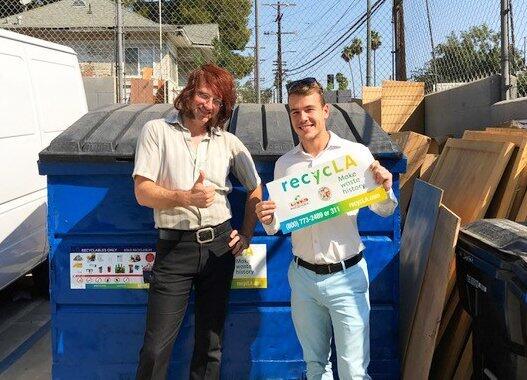2017 has reminded us in stark terms, whether through devastating hurricanes, fires, floods, or record heat waves, that we cannot ignore climate change and that we must take action in every way possible to reverse it. As an affiliate of the Partnership for Working Families (PWF), LAANE believes in the power of cities to create changes at the local level that can be replicated throughout the country. We have seen several instances of cities setting the stage for broader statewide and national change, including the recent minimum wage increase. Policies addressing climate change should follow the same path, and given the regressive policies coming out of DC, cities are more important than ever in creating change.
Immediately following this administration’s astonishing decision to remove ourselves from the Paris Climate Accord, mayors across the country, including Los Angeles Mayor Eric Garcetti, pledged their commitment to upholding the spirit of the agreement. Rather than simply denouncing this backwards stance on climate, Los Angeles is creating a replicable blueprint that other cities can use to take action and protect our environment.
Here in Los Angeles, LAANE’s work with the Don’t Waste LA Coalition, which includes environmental partners like the NRDC, Earthjustice, Sierra Club, LA Food Policy Council, small businesses, food recovery groups, and Teamsters Local 396, has transformed LA’s commercial waste industry. LA’s new exclusive franchise system for businesses and apartments — known as recycLA — will result in major environmental and worker safety benefits in the coming years. LA will see the removal of two million tons of GHG emissions from the atmosphere, the city will divert 90% of waste from landfills by 2025, clean fuel truck fleets will be used instead of dirty diesel trucks, traffic will be reduced, we will invest $200 million in new infrastructure, and additional and improved sanitation jobs will be created for thousands of waste workers.
The implementation of recycLA earlier this summer makes LA a national leader in modern and sustainable waste collection. This is a key example of how cities are fighting back to resist climate change and taking the high-road approach to worker safety and benefits.
It took a great deal of research, coalition building, and advocacy to get us to this point. After dozens of stakeholder meetings and a full Program Environmental Impact Report (PEIR), independent industry experts, city staff, and elected officials concluded that an exclusive franchise system like recycLA is the only way for the city to meet all of its stated goals. This type of system allows LA to hold an important public service to high standards, such as contractually obligating haulers to divert 90% of waste from landfills each year. Haulers that don’t meet the city’s requirements can be fined, or even lose their contract. Non-exclusive systems lack this accountability, making it difficult to get to zero waste.
While implementing a city-wide system change of this magnitude has produced some bumps in the road, it’s important to underscore that recycLA is designed to financially incentivize zero waste. LA has transitioned from using a waste system that made it difficult to do the right thing for the environment by offering expensive recycling, to one that rewards it, since recycLA now provides free recycling to all customers.
A major incentive is for customers to produce less waste to save money, helping us move toward our goal of zero waste. Up to two-thirds of what the commercial sector throws away in LA could be recycled or composted, and the more customers recycle, the more they can potentially save.
Currently, waste haulers are deploying dozens of zero waste specialists to go door-to-door in neighborhoods throughout LA to conduct waste assessments for customers. These assessments teach landlords and commercial property owners how to reduce the size of their existing waste bin or their current number of weekly pickups by recycling more, donating edible food, and doing more efficient front-end purchasing. A great example of a waste assessment consultation is the experience of Vintage King Audio in Echo Park. This business consulted with a waste assessor to better understand its needs, then increased its recycling rate to 90% and its trash bill was cut in half.
With a successful implementation that includes stakeholder participation and education for Angelenos on zero waste, LA has become a national model in leading the resistance against climate change. Other cities are taking notice, and our PWF affiliate in New York City, ALIGN, is spearheading a process that will drastically reduce NYC’s carbon footprint. As LA leads the way, we look forward to other cities embracing actionable resistance at the local level, and paving the way for a national environmental justice platform.
Source: http://bit.ly/2zO2AjO











